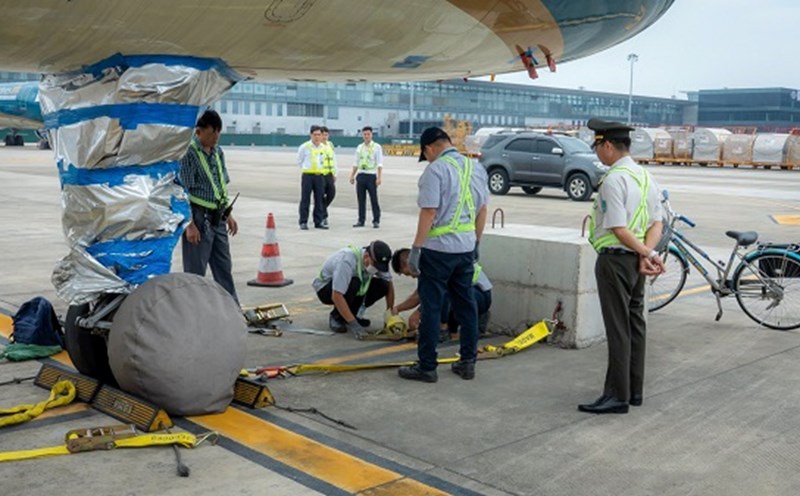Withdrawing documents but still being taxed
As Lao Dong reported, Ms. T.T.H. Yen (Phan Thiet City) submitted an application for a QSDD GCN from March 18, 2024. After receiving the notice of financial obligations on June 6, 2024, Ms. Yen submitted a request to withdraw the application because she was unable to pay taxes. The Phan Thiet City Land Registration Office issued a document approving her withdrawal of her application on July 1, 2024.
However, the tax authority still kept the tax notice and stated that financial obligations had formed at the time when Ms. Yen's file was determined to be eligible and had cadastral information transferred to the tax authority.
Although there is no longer a need to apply for a certificate and no land use rights arise, Ms. Yen is still forced to fulfill financial obligations as an unpaid tax debt.
The law does not prohibit withdrawing documents but lacks regulations on handling post-withdrawal
Discussing this issue with Lao Dong, Lawyer Nguyen Van Dinh (Hanoi Bar Association) analyzed:
Land registration, issuance of Certificates of land use rights, ownership of assets attached to land (abbreviated as "Certificate") is an administrative procedure. In principle, administrative procedures must be made public so that people and businesses... are aware, including the following information: name of procedures; procedures; implementation procedures; file components; settlement deadline; settlement agency...
Currently, administrative procedures in the land sector are announced under Decision No. 2304/QD-BNNMT dated June 23, 2025 of the Minister of Agriculture and Rural Development, in which the agency performing the procedures is the Land Registration Office or Branch of the Land Registration Office; the coordinating agency is the tax authority.
In principle, administrative procedures are carried out at the request of those in need. People in need will submit an application for a Certificate according to the prescribed composition to the agency responsible for handling the procedures and paying financial obligations as required. On the contrary, the procedure-iling agency is responsible for receiving and handling the submitted documents validly within the prescribed time.
Currently, the procedure for granting a Certificate to land users is regulated in detail in Decree No. 101/2024/ND-CP (according to the 2024 Land Law) and amended by Decree No. 151/2025/ND-CP on determining the authority of local authorities at 02 levels and decentralizing and decentralizing in the field of land (previously the procedure was regulated in Decree No. 43/2014/ND-CP - according to the 2013 Land Law). To resolve this procedure, it requires coordination between the land registration office and the tax authority, in which the land registration office transfers information to the tax authority to determine and notify the collection of financial obligations. The issuance of the Certificate is carried out after receiving a notice from the tax authority about the people having fulfilled their financial obligations or being allowed to owe financial obligations (stipulated in Article 36 of Decree No. 101/2024/ND-CP and amended by Clause V, Section C, Part V of Appendix I of Decree No. 151/2025/ND-CP).
The problem here is that both Decree 101 and Decree 151 only stipulate the responsibility to issue Certificates to people who have fulfilled their obligations to pay land use fees, but there are no regulations on the rules of handling when people request to withdraw documents. After the citizen requests to withdraw the application, the Land Registration Office approves the suspension of administrative procedures, there is no regulation on whether this agency must send a document or notification to the tax authority to cancel the notice of financial obligations collection. On the contrary, the collection of land use fees by tax authorities is implemented according to the Law on Tax Administration and the law on tax Administration, which also does not have regulations to apply to this case.
Therefore, there is a "legal gap" here because both land law and tax management law are missing and not regulated. Previously, "legal gaps" were not a prominent issue because financial obligations were determined according to the land price list and did not have to burden the people. However, due to the recent increase in land price lists of localities, many cases have had to withdraw applications for a Certificate, leading to problems such as Ms. Yen's case in Binh Thuan.
In performing public duties, state agencies and state civil servants must resolve the matter according to the order, procedures, and regulations in legal documents. Therefore, in the long term, management agencies need to amend legal regulations to fill the above "spaces".
The Land Law needs to add a provision that if the land registration procedure is stopped, the land registration agency shall send a notice to the tax authority to cancel the notice of financial obligations collection. On the contrary, the law on tax management also needs to supplement corresponding regulations to be consistent and synchronous.











